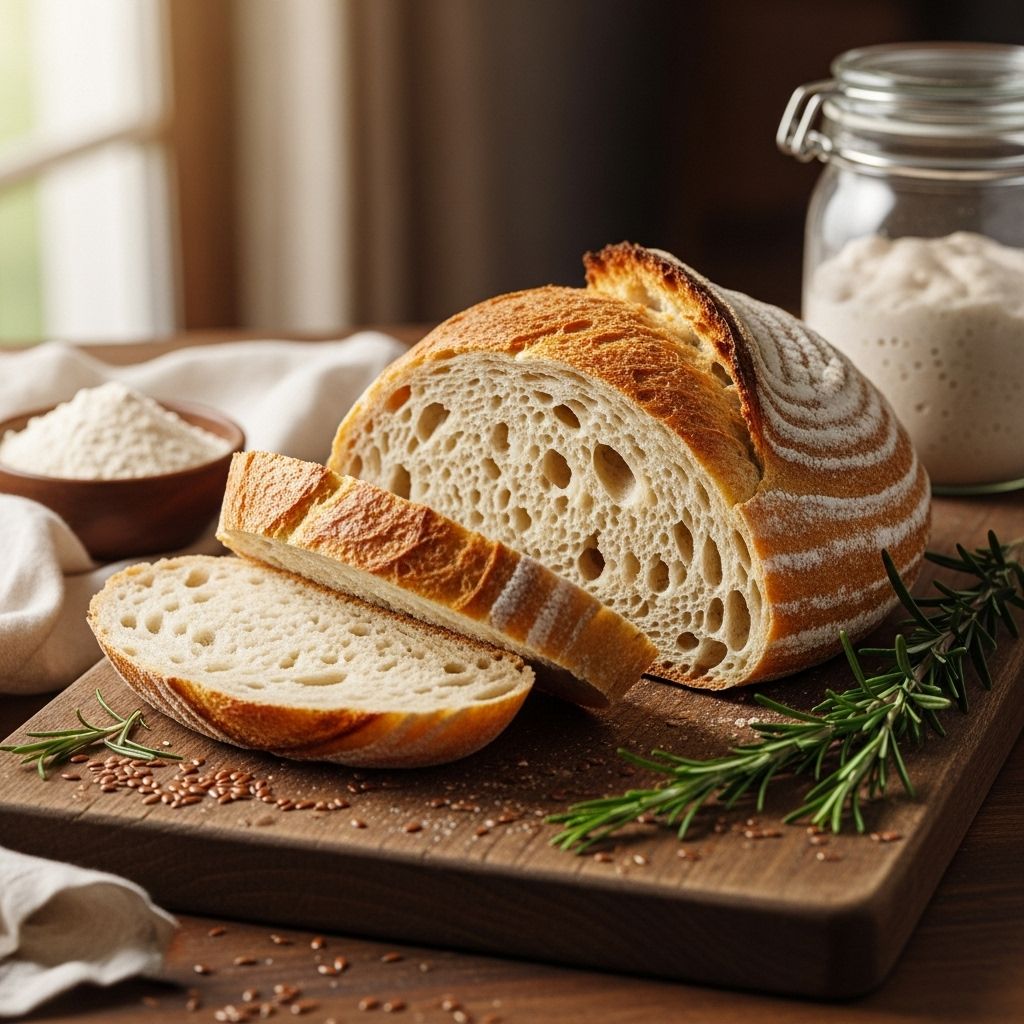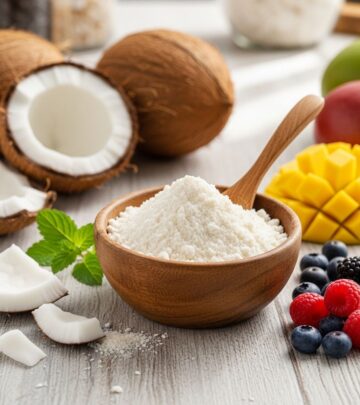Sourdough Bread Nutrition: Benefits, Facts, and Considerations
Fermentation transforms a simple loaf into a nourishing staple that supports energy and digestive ease.

Sourdough bread, a staple cherished for centuries, carries more than just tangy flavor and rustic appeal. Behind its chewy crust and airy crumb lies nutritional value—and a suite of health-promoting features—that sets it apart from other breads. This comprehensive guide breaks down the nutritional facts, the unique advantages brought forth by fermentation, and key tips for including sourdough in a healthful diet.
What Is Sourdough Bread?
Sourdough bread is a type of bread made with a naturally fermented dough, relying on wild yeast and lactic acid bacteria instead of commercial baker’s yeast. The fermentation process not only contributes to its characteristic tang but also affects its nutritional composition and digestibility. Sourdough can be baked with white, whole wheat, rye, or other flours, further influencing its nutrient profile.
Nutritional Profile of Sourdough Bread
| Nutrient | Amount | % Daily Value (DV) |
|---|---|---|
| Calories | 188 | – |
| Carbohydrates | 37g | – |
| Fiber | 2g | – |
| Protein | 8g | – |
| Fat | 1g | – |
| Selenium | – | 32% |
| Folate | – | 21% |
| Thiamine | – | 21% |
| Niacin | – | 20% |
| Riboflavin | – | 17% |
| Manganese | – | 15% |
| Iron | – | 13% |
| Copper | – | 10% |
The nutritional profile can vary depending on the flour used and the baking process. Whole grain sourdough breads typically contain more fiber, minerals, and vitamins than refined white sourdough breads.
How Sourdough Bread Differs from Regular Bread
- Fermentation Process: Sourdough is made using wild yeast and lactic acid bacteria, while regular bread relies on commercial yeast.
- Lower Phytate Levels: Sourdough’s fermentation reduces phytic acid, increasing mineral absorption.
- Unique Flavor and Texture: The natural fermentation imparts a distinctive tang, chewy crumb, and nuanced aroma to sourdough.
Table: Sourdough vs. Regular Bread
| Feature | Sourdough Bread | Regular Bread |
|---|---|---|
| Leavening Method | Wild yeast & Lactic acid bacteria | Commercial yeast |
| Phytate Content | Low (better mineral absorption) | Higher (reduced mineral absorption) |
| Gluten Levels | Lower (but not gluten-free) | Higher |
| Digestibility | Easier for some individuals | Varies |
| Flavor | Tangy, complex | Milder, simple |
Key Health Benefits of Sourdough Bread
1. Improved Mineral Absorption
Phytic acid (phytate) is an “antinutrient” found in grains that binds minerals and reduces their absorption in the digestive tract. The lactic acid bacteria in sourdough fermentation lower the bread’s pH, deactivate phytate, and enable higher absorption of minerals like iron, zinc, magnesium, and potassium.
2. Increased Availability of B Vitamins & Antioxidants
- Folate, thiamine, niacin, riboflavin: These essential B vitamins are well-preserved and sometimes enhanced through the fermentation process.
- Antioxidants: Lactic acid bacteria foster higher antioxidants, which protect cells from damage linked to diseases such as heart disease and cancer.
3. Better Blood Sugar Control
Sourdough bread has a lower glycemic index than white and most commercial breads. The fermentation modifies starches, causing them to be digested and absorbed more slowly—which helps prevent blood sugar spikes and promotes steadier energy levels. This quality is especially beneficial for individuals managing diabetes or insulin resistance.
4. Easier Digestibility
- Prebiotic Fiber: The fibers and resistant starches in sourdough act as prebiotics, nourishing “good bacteria” in your gut and supporting digestive health.
- Lower Gluten Content: Although not gluten-free, sourdough contains less gluten than conventional wheat bread, which may be gentler on the digestive system for those with mild sensitivities.
5. May Promote Heart Health
Whole grain sourdough is rich in fiber, which can help lower cholesterol and support healthy blood pressure levels. Improved nutrient absorption from fermentation further supports cardiovascular function.
Sourdough Bread for Special Diets
- Diabetics: The lower glycemic index and slower digestion are well-suited for stable blood sugar management.
- Mild Gluten Sensitivities: Some individuals with mild sensitivities find sourdough easier to tolerate, although it is not safe for those with celiac disease or severe gluten intolerance.
- Digestive Disorders: People with irritable bowel syndrome (IBS) and other mild digestive concerns may benefit from sourdough due to its prebiotic properties and reduced fermentable carbohydrates.
Potential Downsides and Precautions
- Still Contains Gluten: Sourdough lowers but does not eliminate gluten. It is not suitable for those with celiac disease or serious gluten allergies.
- Sodium Content: As with most breads, sourdough can be high in sodium depending on the recipe. Individuals with hypertension should consume it in moderation.
- Caloric Density: Sourdough is energy-dense; portion control is important in calorie-restrictive diets.
Tips for Including Sourdough Bread in a Healthy Diet
- Choose whole grain varieties to maximize fiber, vitamins, and minerals.
- Look for minimal ingredient lists—ideally flour, water, salt, and starter.
- Pair with protein and healthy fats to balance meals and further slow carbohydrate absorption.
- Store in a cool, dry place or freeze slices to maintain freshness.
- Consider homemade sourdough for control over ingredients, the fermentation process, and nutrition.
How to Make Sourdough Bread at Home (Simplified Steps)
- Prepare the Starter: Mix flour and water and allow wild yeast and bacteria to ferment, usually over 5–7 days.
- Mix Dough: Combine starter with flour, water, and salt; knead well.
- Bulk Fermentation: Allow dough to rise at room temperature for several hours.
- Shape and Proof: Shape the dough; proof for additional hours to enhance flavor and volume.
- Bake: At high temperature for a crusty exterior and soft middle.
Baking at home offers flexibility in ingredient choice and fermentation time, both influencing nutritional value.
Frequently Asked Questions (FAQs) About Sourdough Bread
Q: Is sourdough bread gluten-free?
A: No, sourdough bread contains gluten, although fermentation reduces gluten levels. It is not safe for those with celiac disease or severe gluten intolerance.
Q: Why is sourdough bread easier to digest?
A: The fermentation process partially breaks down carbohydrates and gluten, making sourdough easier to digest for some people and contributing prebiotic compounds that support gut health.
Q: Does sourdough bread raise blood sugar less than regular bread?
A: Yes, sourdough’s fermentation lowers the glycemic index, resulting in a slower and less pronounced blood sugar rise compared to regular bread. This makes it better for those managing blood sugar levels.
Q: What flour is healthiest for sourdough bread?
A: Whole grain flours, such as whole wheat or rye, contribute more fiber, vitamins, minerals, and antioxidants, boosting the bread’s nutritional value.
Q: How should sourdough bread be stored?
A: Sourdough bread is best kept in a cool, dry place for up to five days. It can be sliced and frozen for longer storage—simply defrost and toast as desired.
Key Takeaways
- Sourdough bread excels nutritionally due to fermentation, which enhances mineral absorption, lowers phytate, and improves digestibility.
- It offers better blood sugar control and may support heart and gut health, especially when made with whole grains.
- Those with celiac disease must avoid sourdough due to the presence of gluten, despite reduced levels.
- For optimal health benefits, select whole grain artisan versions and be mindful of serving sizes.
References
- https://www.webmd.com/diet/sourdough-bread-good-for-you
- https://www.healthline.com/nutrition/sourdough-bread
- https://www.uhhospitals.org/blog/articles/2025/05/is-sourdough-bread-healthier-than-regular-bread
- https://www.consumerreports.org/health/healthy-eating/is-sourdough-bread-good-for-you-a6956800331/
- https://pmc.ncbi.nlm.nih.gov/articles/PMC10103004/
- https://www.bbcgoodfood.com/health/nutrition/health-benefits-sourdough
- https://abreadaffair.com/bakery-vancouver/11-reasons-everyone-eating-sourdough-bread/
Read full bio of Sneha Tete













